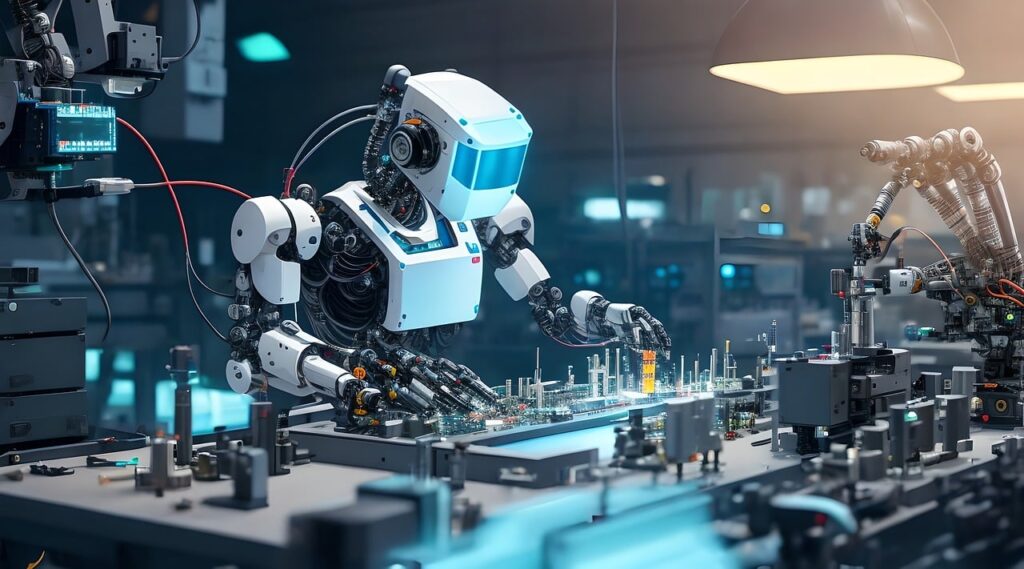The Power of AI in Business: Revolutionizing the Path to Success
Artificial Intelligence (AI) has rapidly transformed various industries, and the world of business is no exception. As advanced algorithms, machine learning, and automation continue to progress, companies are discovering innovative ways to leverage AI to gain a competitive edge and drive growth. In this blog post, we will explore the remarkable application of AI in business and uncover how this technology is revolutionizing the path to success.
1. Enhanced Decision-Making:
Artificial Intelligence (AI) has revolutionized the way businesses make critical decisions. AI possesses a remarkable capability to support and augment decision-making processes, offering a multitude of benefits. One of the key advantages that AI brings to the table is its exceptional ability to analyze colossal volumes of data, recognize intricate patterns and trends, and provide invaluable insights for strategic decision-making.
Traditional decision-making methods have often been subjected to the limitations of human bias and subjectivity. However, with AI algorithms, these limitations can be significantly minimized if not completely eliminated. By leveraging data-driven insights and reducing the influence of inherent human biases, businesses can make decisions that are more informed, precise, and objective.
Moreover, with the continuous advancements in AI technology, decision-making processes have become faster and more efficient. AI systems are capable of swiftly processing and interpreting massive amounts of data, enabling businesses to save time and resources while making critical decisions. This acceleration not only enhances operational efficiency but also ensures timely responses to evolving market dynamics.
In addition, AI-driven decision-making has the potential to minimize risks for businesses. By reliably analyzing data and identifying patterns, AI algorithms can uncover hidden risks that may otherwise go unnoticed by human analysts. This proactive risk assessment empowers business leaders to adopt proactive measures, mitigate potential vulnerabilities, and safeguard their organizations from unexpected pitfalls.

2. Streamlined Operations:
AI-powered automation has brought about a seismic shift in the realm of operational efficiency for businesses. By harnessing the capabilities of machine learning algorithms, organizations are now able to effectively automate monotonous, rule-based tasks. This groundbreaking technology liberates employees from the burden of repetitive activities, allowing them to dedicate their time and energy towards more intricate and innovative endeavors. The integration of AI automation spans across various domains, including supply chain management and customer service, effectively streamlining operations while simultaneously driving cost reduction and bolstering productivity.
The advent of AI-driven automation has ushered in a new era of efficiency for businesses. By leveraging machine learning algorithms, organizations are now able to automate tasks that were previously reliant on human intervention. Repetitive and predictable processes, such as data entry, inventory management, and invoice processing, can now be undertaken by AI systems. This not only eliminates the potential for human error but also allows employees to shift their focus towards more complex and higher-value tasks that require critical thinking and creativity. As a result, the overall efficiency and productivity of the workforce is greatly enhanced.
Supply chain management is one area where AI automation has truly revolutionized operations. By utilizing AI-powered algorithms, businesses are able to optimize inventory levels, forecast demand patterns, and streamline logistics. Traditional supply chain management involves complex decision-making processes that can be highly labor-intensive. However, with the integration of AI automation, these processes can be effectively streamlined and optimized, leading to cost savings, reduced lead times, and improved customer satisfaction.
Customer service is another domain that has witnessed significant transformation through AI automation. AI-powered chatbots and virtual assistants have become increasingly prevalent in the realm of customer support. These intelligent systems are capable of understanding and responding to customer queries, reducing the need for human intervention. By automating routine customer interactions, organizations can achieve faster response times, enhance the overall customer experience, and allocate human resources to more complex and nuanced customer issues.
In addition to streamlining operations and enhancing customer service, AI-driven automation also has a significant impact on cost reduction. By automating repetitive tasks, businesses can achieve substantial savings in terms of time, effort, and resources. This, in turn, leads to increased operational efficiency and cost-effectiveness. Moreover, AI automation allows organizations to optimize processes and make data-driven decisions, resulting in improved resource allocation and reduced wastage. The combination of these factors ultimately contributes to significant cost savings for businesses.
Furthermore, AI-driven automation offers scalability and adaptability, allowing organizations to seamlessly adjust operations to meet changing demands. Machine learning algorithms enable systems to continuously learn and improve, leading to enhanced decision-making capabilities and increased operational agility. With AI automation, businesses can easily scale up or down their operations as needed, ensuring optimal resource utilization and maximizing productivity.

3. Personalized Customer Experiences:
In the modern business landscape, the advent of Artificial Intelligence (AI) has revolutionized the way organizations engage with their customers. AI-powered chatbots and virtual assistants have emerged as dynamic tools that enable companies to offer personalized and efficient customer service around the clock. By leveraging the power of natural language processing, these advanced systems can comprehend and respond to customer queries in real-time, delivering unparalleled levels of satisfaction and fostering lasting customer loyalty.
Gone are the days when customers had to wait in long queues or endure frustrating phone calls to seek assistance from a company. With the integration of AI technology, businesses can now streamline their customer support processes and provide individuals with tailored experiences that cater to their specific needs and expectations. These AI-driven chatbots and virtual assistants possess the ability to understand the nuances of human language, ensuring that customers receive prompt and accurate responses to their queries or concerns.
The advantages of personalized customer experiences facilitated by AI are manifold. First and foremost, customers no longer have to navigate complex menus or repeatedly explain their issues to multiple representatives. Instead, they can engage in natural and conversational interactions with these AI-powered systems, creating a seamless and intuitive user experience. This not only leads to heightened customer satisfaction but also enhances the overall perception of the brand, positioning the company as a forward-thinking and customer-centric entity.
Moreover, the instantaneous nature of AI-driven customer service ensures that customers receive timely assistance regardless of the time or location. This round-the-clock availability enhances customer convenience and negates the frustration associated with delayed responses or limited support hours. Furthermore, AI-powered systems can store and recall customer preferences and past interactions, enabling a personalized service that solidifies customer trust and loyalty.
In essence, the integration of AI into customer service processes has revolutionized the way businesses interact with their customers. It has ushered in an era of personalized and prompt customer experiences, where the power of AI-driven chatbots and virtual assistants ensures that customers receive timely, accurate, and customized solutions to their queries. By employing these cutting-edge technologies, companies can elevate their customer service capabilities, foster lasting customer relationships, and thrive in the digital age.

4. Advanced Data Analytics:
In the era of digital transformation, businesses are inundated with an unprecedented amount of data. Harnessing the power of this information has become crucial for organizations to gain a competitive edge. This is where advanced data analytics comes into play. Utilizing the capabilities of AI, businesses can analyze vast amounts of data in real-time, providing valuable insights and driving informed decision-making.
With advanced data analytics, business leaders can make accurate predictions and identify emerging trends, enabling them to adapt their strategies accordingly. By leveraging this intelligent analysis, organizations are able to optimize various operational aspects, such as sales forecasting, pricing strategies, and inventory management.
One of the key benefits of advanced data analytics is its ability to enhance sales forecasting. By analyzing historical sales data, AI algorithms can identify patterns and correlations, helping organizations forecast future sales with greater accuracy. This not only enables businesses to plan their resources effectively but also allows them to adjust their marketing and sales strategies to meet customer demands proactively.
In addition, AI-powered data analytics allows organizations to refine their pricing strategies. By analyzing market trends, competitor prices, and customer preferences, businesses can optimize their pricing models to maximize profitability while remaining competitive in the market. With real-time data analysis, businesses can easily track price elasticity and make necessary adjustments to drive customer satisfaction and revenue growth.
Furthermore, advanced data analytics aids in effective inventory management. By analyzing data related to sales, customer behavior, and supply chain performance, businesses can optimize their inventory levels to avoid stockouts or overstock situations. This leads to improved operational efficiency, reduced costs, and enhanced customer satisfaction.

5. Improved Cybersecurity:
In the ever-evolving landscape of technology, ensuring robust cybersecurity has become paramount for businesses. With the rapid increase in cyber threats, organizations are consistently seeking innovative solutions to safeguard sensitive information. This is where the power of AI shines, significantly bolstering security measures.
AI technology, particularly machine learning algorithms, can revolutionize the cybersecurity domain by detecting and responding to emerging threats in real-time. By analyzing vast amounts of historical data, these algorithms gain insights into patterns and behaviors, enabling them to identify anomalies that may indicate potential cyber attacks. This proactive approach allows businesses to detect and mitigate threats before they infiltrate their systems and compromise critical data.
One of the notable advantages of AI-powered cybersecurity systems is their ability to continuously learn and adapt. As new threats emerge, the algorithms can be trained to recognize and respond to them effectively, staying one step ahead of malicious actors. The speed and accuracy with which AI systems respond to and neutralize threats help prevent data breaches that can have severe financial and reputational consequences for businesses.
In addition to identifying threats, AI can aid in improving the robustness of security systems. By analyzing data logs and network traffic, AI algorithms can uncover vulnerabilities within an organization’s infrastructure. This enables businesses to proactively address security gaps and reinforce their defenses, ensuring that their critical information remains protected and their operations continue uninterrupted.
Furthermore, AI technologies can enhance incident response capabilities. By automating certain tasks, such as threat analysis and incident triage, AI systems can significantly reduce response times. This not only saves valuable resources but also increases the efficiency and effectiveness of incident response teams, mitigating the potential impact of cyber threats.
As cyber threats continue to grow in complexity, investing in AI-based cybersecurity solutions is critical for businesses. The integration of AI algorithms empowers organizations to bolster their security measures, detect and respond to threats in real-time, and fortify their infrastructure against potential attacks. By leveraging AI technology, businesses can ensure the security and privacy of their critical information, and ultimately gain a competitive edge in the digital world.
6. Augmented Human Resources:
The emergence of Augmented Human Resources has brought about tremendous changes in the HR domain, courtesy of AI technology. This transformative technology has had a significant impact on various HR tasks, including resume screening, candidate sourcing, and interview scheduling. By automating these processes, HR professionals are now able to redirect their attention towards more critical responsibilities, such as strategic talent acquisition and employee development. This shift allows for more personalized engagement and ensures that the right individuals are hired for the right positions.
In addition to streamlining administrative tasks, AI tools have proven invaluable in gauging employee sentiment and boosting engagement within the workplace. By analyzing various data points, such as employee surveys, performance metrics, and feedback, AI-based systems can provide valuable insights into employee satisfaction levels and identify potential areas for improvement. Armed with this knowledge, HR professionals can take proactive measures to foster a positive work culture and enhance overall employee well-being.
Moreover, AI technology has also been instrumental in facilitating the remote work revolution. With the ongoing global pandemic, many companies have been forced to transition to telework arrangements. AI-powered tools have played a crucial role in enabling smooth collaboration by offering virtual communication platforms, project management systems, and performance tracking software. This technology has not only ensured business continuity but has also enhanced productivity and efficiency in remote work settings.
However, it is essential to remember that AI should be seen as a supportive tool rather than a replacement for human intuition and decision-making. While AI can streamline and improve HR processes, it is vital for HR professionals to leverage their expertise in interpreting data and making informed decisions. By striking the right balance between human judgment and AI assistance, organizations can optimize their HR functions and create a thriving, inclusive work environment for their employees.

Conclusion
Artificial Intelligence (AI) has established itself as a disruptive force in the business world, completely transforming the way organizations operate and compete. With its numerous applications in decision-making, operations, customer service, and cybersecurity, AI has the ability to revolutionize every aspect of a business. Embracing AI and harnessing its capabilities can unlock a vast array of new opportunities, drive innovation, and pave the way for future success.
Organizations that fully embrace AI can gain a tremendous competitive advantage. By utilizing AI algorithms and machine learning, businesses can effectively analyze large volumes of data to make informed decisions quickly and accurately. This enables them to streamline their operations, identify areas of improvement, and optimize their business processes.
Furthermore, AI-powered chatbots and virtual assistants can enhance customer service by providing instant and personalized support, improving customer satisfaction and loyalty.
In the realm of cybersecurity, AI can play a vital role in detecting and preventing cyber threats. By continuously monitoring network activity and analyzing patterns, AI systems can quickly identify and mitigate potential risks, safeguarding sensitive information and minimizing the impact of cyber attacks.
In essence, embracing AI technology is not only a necessity but also an opportunity for businesses to stay ahead in an increasingly competitive landscape. By integrating AI into their operations and embracing the possibilities it offers, organizations can unlock new levels of efficiency, drive innovation, and pave the way for future growth and success.
